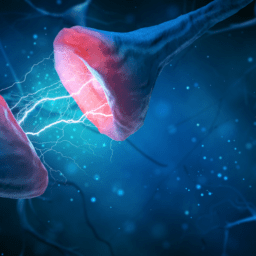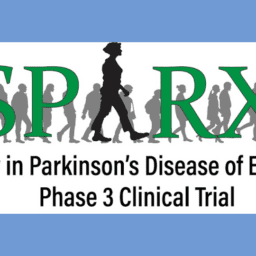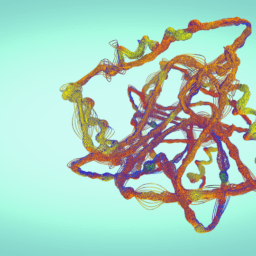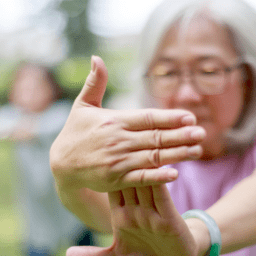This month’s Parkinson’s news cycle included updates on the CPDR, numerous studies on alpha-synuclein, the latest FDA approvals for Parkinson’s therapies, the most in-depth look at dance’s impact on Parkinson’s to date, and much more. Let us know if we missed anything!
PARKINSON’S ARTICLES AND PODCASTS
- New compounds developed by chemists in Russia may have the ability to protect neuronal tissue from an excess of toxic amyloids (a main cause of a variety of brain diseases) and repair the damage of neurodegenerative diseases like Parkinson’s and Alzheimer’s. In their study, the researchers from the Ural Federal University explain how the new pyrrolyl- and indolylazine classes of compounds have been shown to increase the survival of neurons in cellular models of Alzheimer’s as well as in models that simulate traumatic brain injury.
- With the help of $8.4 million in funding, California will expand the California Parkinson’s Disease Registry (CPDR), allowing the state to collect more data to inform research about Parkinson’s and other neurological conditions. The goal of the CPDR, which was enacted in 2004, is to acquire, record, and analyze epidemiological data about the incidence and prevalence of Parkinson’s throughout the state in order to identify Parkinson’s “hot spots.” In addition to assisting researchers in developing Parkinson’s treatments, the registry also informs the national Parkinson’s data collection effort at the US Centers for Disease Control and Prevention.
- Copenhagen-based Muna Therapeutics has raised $73 million to develop small-molecule treatments for Parkinson’s, Alzheimer’s, and other neurodegenerative condition. The funds will support research that focuses on repairing neuronal dysfunction, resolving neuroinflammation, and restoring neuroprotection and resilience to disease.
- In other Copenhagen news, researchers from the University of Copenhagen have published a study explaining that the most common form of Parkinson’s (encompassing 90 to 95% of all Parkinson’s cases) known as “sporadic Parkinson’s,” is caused by a blockage in a pathway that regulates the body’s mitochondria. This blockage causes high amounts of damaged mitochondria to accumulate and negatively impacts the production of energy for cells. As a result, neurons gradually begin to die, which can lead to the development of Parkinson’s symptoms and to dementia. The team hopes their findings will encourage research that explores how to counteract the pathway blockage.
- The discovery of a natural molecule in the human brain that blocks the aggregation of oligomers (the most pathogenic forms of alpha-synuclein that can lead to Parkinson’s) and prevent alpha-synuclein’s neurotoxicity may lead to new therapies and strategies to manage Parkinson’s. The human peptide has been identified by a team of researchers from the Institute for Biotechnology and Biomedicine at the Universitat Autònoma de Barcelona and the Instituto de Biocomputación y Física de Sistemas Complejos of the Universidad de Zaragoza and described in their paper recently published in Nature Communications.
- A July 2021 article in The Washington Post highlights how Parkinson’s experts still do not understand why men are 1.5 times more likely than women to develop Parkinson’s. “It’s a great mystery,” says J. William Langston, who has been studying and treating Parkinson’s for almost 40 years.
- A pilot study has found that an experimental epigenetic editing therapy for Parkinson’s, SLS-004, effectively reduced the production of alpha-synuclein (the protein that, when overproduced, can form the toxic clumps associated with Parkinson’s) in the brains of healthy mice. After these promising results, Seelos Therapeutics, which acquired SLS-004 in 2019, will sponsor proof-of-concept preclinical studies at Duke University School of Medicine to investigate whether the therapy can safely and effectively prevent and/or delay the progression of Parkinson’s in a mouse model.
- Researchers at Salk Institute have discovered a direct link between a “master sensor of cell stress” and the protein called Parkin, decoding a crucial step in the process in which cells dispose of defective mitochondria. Their findings show a link between Parkinson’s, type 2 diabetes, and certain cancers and offer further insights into why the diabetes drug metformin has been found to suppress cancer and may help restore function in people with neurodegenerative conditions like Parkinson’s. “The general mechanisms that underpin the health of the cells in our bodies are way more integrated than anyone could have ever imagined,” the lead researcher said.
- Southern Research, a nonprofit scientific research organization based in Birmingham, AL, has received a $3.3 million grant from the National Institute of Neurological Disorders and Stroke to advance their Parkinson’s research on a molecule that may keep brain cells, like those impacted by Parkinson’s, from dying. The nonprofit will collaborate with the University of Alabama Birmingham, Virginia Tech, and the University of Michigan on the project.
- The US Food and Drug Administration (FDA) has granted Bayer subsidiary BlueRock Therapeutics LP “Fast Track designation” for their pluripotent stem cell-derived dopaminergic neuron therapy called DA01. This designation means the company may qualify for more frequent interaction with the FDA to discuss the drug’s development plan and may also be eligible for accelerated approval and priority review. DA01 is currently undergoing a Phase 1 clinical trial to assess its safety and tolerability one year after transplant.
- The FDA has also given clearance to Inhibikase Therapeutics, Inc., to begin a Phase 1b extension study to evaluate IkT-148009, the pharmaceutical company’s lead Parkinson’s drug candidate. IkT-148009 has been shown in a Phase 1 study to safely and effectively inhibit Abelson Tyrosine Kinase (c-Abl), a protein that plays an essential role in driving neurodegeneration and neuroinflammation, as well as to clear away harmful alpha-synuclein aggregates.
- A non-toxic derivative of the tetanus neurotoxin (the one that causes tetanus infections) has recently been shown to not only significantly treat depression but to also, perhaps, treat neurodegenerative conditions such as Parkinson’s and amyotrophic lateral sclerosis (ALS). The derivative, called Hc-TeTx, may have the ability to stop these diseases’ pathology from developing while also eliminating any related depression.
- A July episode of the Help with Parkinson’s podcast takes a deep dive into the topic of festination, an involuntary quickening of gait that is common in Parkinson’s.
- On Parkinson’s and Me, the host shines the spotlight on Parkinson’s care partners and the many roles they play.
PARKINSON’S THERAPIES AND MEDICATIONS
- The first study of its kind, which followed people with Parkinson’s for three years as they took part in dance training with music, found that doing this activity for 1.25 hours per week can slow the progression of Parkinson’s in people with mild-to-moderate symptoms. Published in Brain Sciences, the study also found that dancing with music reduced common symptoms including those related to balance and speech.
- A flexible hydrogel device that functions for six months and allows scientists to stimulate and deflect brain signals in real time may pave the way to better more effective deep brain stimulation (DBS). Researchers at the Korea Advanced Institute of Science and Technology report in the journal Nature Communications that by encasing in hydrogel a bundle of optical fibers that use light to control specific nerve cells, they were able to stimulate electrical activity in specific brain regions of mice while putting less strain on surrounding brain tissue and creating less scarring than other methods of implantation.
- Published in the journal Archives of Medical Research, a new rat model study found that Mirapex (pramipexole) reduced levels of immune proteins in the brain that are associated with inflammation. Designed and FDA-approved to relieve some motor symptoms of Parkinson’s, Mirapex was found to not only significantly improve motor function in the rats but also to decrease the level of inflammatory factors in the rats’ central nervous systems. “Additionally, the drug improved behavior of these rats,” the researchers reported.
- Nuplazid (pimavanserin), approved in the US to treat Parkinson’s-related hallucinations and delusions, may be able to mitigate hallucinations in people with dementia as well. Data from a study recently published in the New England Journal of Medicine showed that during an 18-week period, trial participants living with dementia who were given Nuplazid were 65% less likely to see a resurgence of their hallucinations and delusions than those taking a placebo.
- Melatonin, a hormone best known for its role in regulating the body’s circadian rhythm and sleep-awake cycles, has been shown to decrease neuroinflammation in Parkinson’s. Researchers at Zhejiang University in China report that melatonin, which is involved in several biological activities other than those related to sleep, increases the levels of an enzyme that protects against chronic inflammation and, therefore, minimized neurodegeneration and motor symptoms in a mouse model of Parkinson’s. Results of the study were published in the Journal of Inflammation Research.
- Utilizing new technology, the FDA-approved Abbott system allows for remote programming of DBS devices. People with Parkinson’s who have the Abbott device implanted can connect to their physicians and programmers via telemedicine, and their teams can monitor their movements and remotely adjust their DBS programming as needed, from hundreds of miles away.
- In a filing for a new patent, Therapeutic Solutions International, Inc., reports that immunotherapy that utilizes dendritic cells obtained from umbilical cord blood has been shown in an animal model to suppress brain inflammation and preserve dopaminergic neurons in the brain. The company has recently partnered with Campbell Neurosciences to adapt their StemVacs technology to use in neurodegenerative diseases such as Parkinson’s.
- Findings from a study recently published in the International Journal of Pharmaceutics: X suggest that because just a single dose of probiotic created a change in microbial diversity for more than 48 hours, supplementing a diet with a probiotic could be an effective add-on therapy for people with Parkinson’s, provided that the development and/or progression of Parkinson’s is influenced by gut microbiota, as has been suggested.
PARKINSON’S LIVING WELL STORIES
- Yves Auberson, who last year hiked more than 1,100 kilometers across the Alps to raise awareness about Parkinson’s, is planning his next challenge, which he says will involve “water and a bike.” Auberson, who was diagnosed with Parkinson’s at age 35 and is now 52, recently underwent DBS surgery and says that as a result, “everything has changed. Really, everything. I can do things I couldn’t do anymore.”
- Claudia Piñeiro’s short novel Elena Knows features a narrator who, while living with Parkinson’s, defies stereotypes and takes charge while being, as the New York Times review says, “underestimated and impaired because of a disease she refers to in profane terms.”
- Mark Richt, the 61-year-old former Georgia and Miami football coach, recently announced that he has been diagnosed with Parkinson’s. “I am going to enjoy the blessings that I do have,” he says of the news.
- After receiving a Parkinson’s diagnosis, Ray Cali from Greece says he and his wife were in shock but that “by the time we got out to the parking lot after that appointment, we had decided that Parkinson’s is not going to run our life.” Since learning that exercise is the only proven way to slow the progression of Parkinson’s, he has played an average of 100 rounds of golf each year, walking every single one of them.
- Fifty-six-year-old Scott Perry, who recently underwent DBS surgery using the new Medtronic DBS device, says that while a DBS procedure “looks spooky [and] sounds scary,” it has decreased his tremors and has “opened me up to do anything I want to do.“
PARKINSON’S SURVEYS, CLINICAL TRIALS, and volunteer opportunities
SPARX3: A Phase 3 Clinical Trial about Exercise and Parkinson’s – This research team is currently seeking volunteers to participate in a clinical trial about the effects of aerobic exercise on people with Parkinson’s. Learn more and see if you qualify here. For more details, contact Katherine Balfany at SPARX3@ucdenver.edu.
Do you have early-stage Parkinson’s? The Orchestra Study is a clinical research study to evaluate the use of an investigational medication called UCB0599 in men and women with early-stage Parkinson’s. You can learn more and see if you qualify here.
PAIRing Up – If you are a person with Parkinson’s or a care partner to someone with Parkinson’s, you are invited to participate in an online survey to address neuropsychiatric (cognition, depression, anxiety) concerns in Parkinson’s. The survey aims to learn about the needs and priorities for clinical care, education, support, and research related to neuropsychiatric symptoms. To learn more and participate, click here to download the flyer.
A multidisciplinary research team in the UK is investigating how to best use music to help people with Parkinson’s manage symptoms related to movement and mood. This includes research about music for dancing and is the first study to incorporate the new Dance Sophistication Index for people with Parkinson’s. To learn more and take a 30-minute survey, click here.
The University of Oulu and collaborators from Aalborg University, Fraunhofer University, the University of Manchester, the University of Glasgow, the University of Lisbon, and the University of Melbourne, are conducting a survey for people with Parkinson’s and Parkinson’s care partners about self-care. Complete the survey here to share your self-care strategies and techniques. You can also review ideas submitted by others and add them to your own self-care toolbox.
BouNDless – Phase 3 trial to investigate the efficacy, safety, and tolerability of ND0612, a continuous subcutaneous levodopa/carbidopa delivery system in comparison to oral levodopa/carbidopa in people with Parkinson’s experiencing motor fluctuations
Parkinson’s Progression Markers Initiative (PPMI) Screen Survey – The Michael J. Fox Foundation
Home-based Exercise and Cognitive Behavior Therapy – University of Alabama in Huntsville
Speech and Telemedicine Study – The Purdue Motor Speech Lab
Parkinson’s and Service Dogs – University of Groningen, Netherlands
Neurology Study Interest Registry – University of Rochester
Park Test – University of Rochester
Project Euphonia – LSVT Global and Project Euphonia
For more of what’s new in Parkinson’s news, check out our full series here.
WANT MORE PRACTICAL ARTICLES LIKE THIS?
You can find much more in our Every Victory Counts® manual. It’s packed with up-to-date information about everything Parkinson’s, plus an expanded worksheets and resources section to help you put what you’ve learned into action. Request your free copy of the Every Victory Counts manual by clicking the button below.
Thank you to our 2021 Peak Partners, Adamas, Amneal, Kyowa Kirin, and Sunovion, as well as our Every Victory Counts Gold Sponsor AbbVie Grants, Silver Sponsor Lundbeck, and Bronze Sponsors Supernus and Theravance for helping us provide the Every Victory Counts manual to our community for free.

















